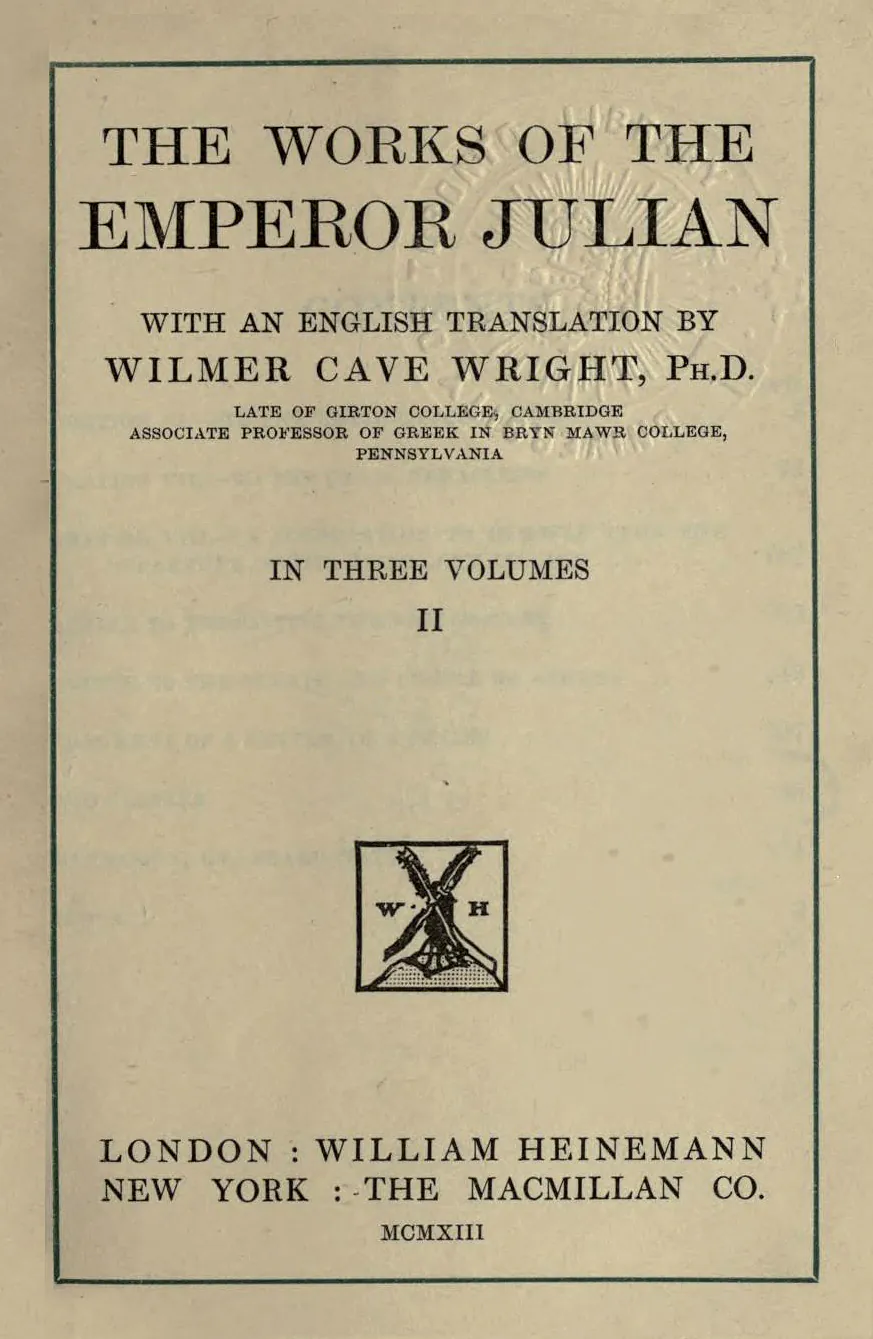[A]
ἑκόντες ὑμῖν ἐξιστάμεθα τῆς πόλεως. οὐ γὰρ οἶμαι ῥᾴδιον ἐν γήρᾳ μεταθεμένῳ διαφυγεῖν τὸν λεγόμενον ὑπὲρ τοῦ ἰκτῖνος μῦθον. λέγεται γάρ τοι τὸν ἰκτῖνα φωνὴν ἔχοντα παραπλησίαν τοῖς ἄλλοις ὄρνισιν ἐπιθέσθαι τῷ χρεμετίζειν, ὥσπερ οἱ γενναῖοι τῶν ἵππων, εἶτα τοῦ μὲν ἐπιλαθόμενον, τὸ δὲ οὐ δυνηθέντα ἑλεῖν ἱκανῶς ἀμφοῖν στέρεσθαι καὶ φαυλοτέραν τῶν ἄλλων ὀρνίθων εἶναι τὴν φωνήν.
[B]
ὃ δὴ καὶ αὐτὸς εὐλαβοῦμαι παθεῖν, ἀγροικίας τε ἅμα καὶ δεξιότητος ἁμαρτεῖν. ἤδη γάρ, ὡς καὶ ὑμεῖς αὐτοὶ συνορᾶτε, πλησίον ἐσμὲν ἐθελόντων θεῶν,
Εὖτέ μοι λευκαὶ μελαίνοις ἀναμεμίξονται τρίχες,
ὁ Τήιος ἔφη ποιητής.
Εἶεν. ἀλλὰ τῆς ἀχαριστίας, πρὸς θεῶν καὶ Διὸς ἀγοραίου καὶ πολιούχου, ὑπόσχετε λόγον. ἠδίκησθέ τι παρ ̓ ἐμοῦ κοινῇ πώποτε ἢ καὶ1ἢ καὶ Hertlein suggests, καὶ MSS. ἰδίᾳ,
[C]
καὶ δίκην ὑπὲρ τούτου λαβεῖν οὐ δυνάμενοι φανερῶς διὰ τῶν ἀναπαίστων ἡμᾶς, ὥσπερ οἱ κωμῳδοὶ τὸν Ἡρακλέα καὶ τὸν Διόνυσον ἕλκουσι καὶ περιφέρουσιν, οὕτω δὲ καὶ ὑμεῖς ἐν ταῖς ἀγοραῖς ἐπιτρίβετε λοιδοροῦντες; ἢ τοῦ μὲν ποιεῖν τι χαλεπὸν εἰς ὑμᾶς ἀπεσχόμην, τοῦ λέγειν δὲ ὑμᾶς κακῶς οὐκ ἀπεσχόμην, ἵνα με καὶ ὑμεῖς διὰ τῶν αὐτῶν ἰόντες ἀμύνησθε; τίς οὖν ὑμῖν ἐστιν αἰτία τοῦ πρὸς ἡμᾶς προσκρούσματος καὶ τῆς ἀπεχθείας; ἐγὼ γὰρ εὖ οἶδα δεινὸν
[D]
οὐδένα ὑμῶν οὐδὲν οὐδὲ ἀνήκεστον ἐργασάμενος οὔτε ἰδίᾳ τοὺς ἄνδρας οὔτε κοινῇ τὴν πόλιν, οὐδ ̓ εἰπὼν οὐδὲν φλαῦρον, ἀλλὰ καὶ ἐπαινέσας, ὡς ἔδοξέ μοι προσήκειν, καὶ μεταδοὺς χρηστοῦ τινος, ὅσον εἰκὸς ἦν τὸν ἐπιθυμοῦντα μετὰ τοῦ δυνατοῦ πολλοὺς εὖ ποιεῖν ἀνθρώπους. ἀδύνατον δ ̓ εὖ ἴστε καὶ τοῖς εἰσφέρουσι συγχωρεῖν ἅπαντα
[A]
I willingly go away and leave your city to you. For when a man changes his habits in his old age it is not easy, I think, for him to escape the fate that is described in the legend about the kite. The story goes that the kite once had a note like that of other birds, but it aimed at neighing like a high-spirited horse; then since it forgot its former note and could not quite attain to the other sound, it was deprived of both, and hence the note it now utters is less musical than that of any other bird.
[B]
This then is the fate that I am trying to avoid, I mean failing to be either really boorish or really accomplished. For already, as you can see for yourselves, I am, since Heaven so wills, near the age “When on my head white hairs mingle with black,” as the poet of Teos said.2Anacreon fr. 77, Bergk.
Enough of that. But now, in the name of Zeus, God of the Market-place and Guardian of the City, render me account of your ingratitude. Were you ever wronged by me in any way, either all in common or as individuals,
[C]
and is it because you were unable to avenge yourselves openly that you now assail me with abuse in your market-places in anapaestic verse, just as comedians drag Heracles and Dionysus on the stage and make a public show of them?3cf. Oration 7. 204 B. Or can you say that, though I refrained from any harsh conduct towards you, I did not refrain from speaking ill of you, so that you, in your turn, are defending yourselves by the same methods? What, I ask, is the reason of your antagonism and your hatred of me?
[D]
For I am very sure that I had done no terrible or incurable injury to any one of you, either separately, as individuals, or to your city as a whole; nor had I uttered any disparaging word, but I had even praised you, as I though I was bound to do, and had bestowed on you certain advantages, as was natural for one who desires, as far as he can, to benefit many men. But it is impossible, as you know well, both to remit all their taxes to the taxpayers
EN translation: Wilmer Cave Wright, 1913
LEARN MORE
Place your mouse over a term to see corresponding popup from Wikipedia.
ALL PAGES

| Title | London: The Works of the Emperor Julian, Volume II/III |
| Publisher | London: William Heinemann |
| Year | 1913-23 |
| Pages | 416-511 pp. [vol. II: 538 pp.] |
| Translation | Wilmer Cave Wright. PhD |
| Editors | T.E. Page and W.H.D. Rouse |


